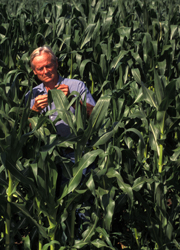Integrated management approach to pest control
Western Corn Rootworm (WCR-Diabrotica virgifera virgifera) constitutes a serious threat to maize cultivation globally. The pest insect larvae feed on the corn roots hampering the transport of water and nutrients into the plant. Although severe root injury interferes with plant growth and pollination, the precise economic impact of WCR on farm and food remains largely unknown. Also, various research activities have aimed to reduce WCR populations, but there is an urgent need for such activities to be integrated under a common scientific and administrative plan. The EU-funded ‘Harmonise the strategies for fighting Diabrotica virgifera virgifera’ (DIABR-ACT) project had as its main objective the establishment of a unified control strategy for WCR populations. Project partners aimed to design a coordinated plan to improve WCR control and prevention across Europe using established control strategies while identifying priority research in the field. Pest management and eradication costs were also evaluated. A number of control strategies for WCR management were explored including biological control, utilisation of plant resistance traits, the adaptation of biotechnological approaches and cultural techniques. Although each country would have to adopt those strategies to its national needs, all measures had to have minimum impact on biodiversity and the environment. Additionally, a database was constructed containing all available literature on the ecology of WCR and current research activities, and a comprehensive review was written of past research focusing on WCR biology. Experts in maize agriculture and WCR ecology were brought together to develop biological control strategies for WCR that could integrate with already established control options used against other maize pests. Researchers also looked into the possibility of enhancing and maintaining various natural enemies of WCR in order to reduce pest outbreak. the achievements of the DIABR-ACT project were summarised in a report containing the most promising biological control strategies that European countries should implement to suppress WCR populations. The suggested integrated management approach is expected to restrict WCR outbreaks and improve European maize production systems.







